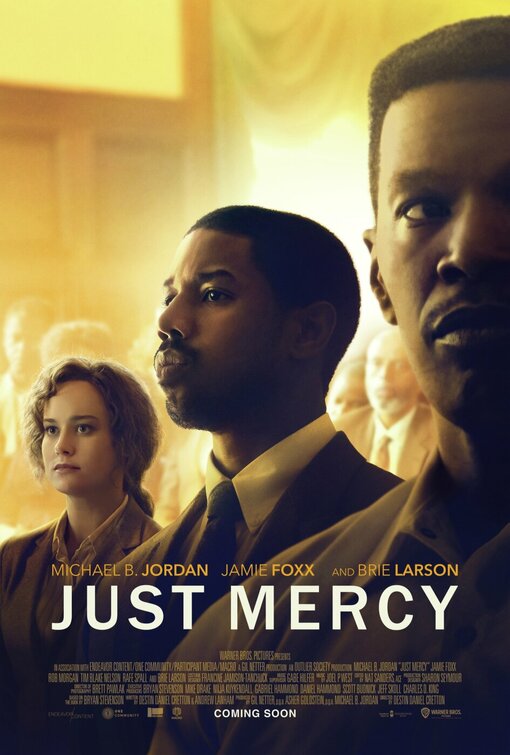Every Generation Has Its Hero. Meet Ours
Director
Destin Daniel Cretton
Starring
Michael B Jordan
Jamie Foxx
Brie Larson
Set in the late eighties and early nineties, Just Mercy is the story of young defence attorney Bryan Stevenson [Jordan] who, after an experience interning with death row inmates, is moved to represent them when no others will. Once he receives his degree from Harvard he moves from Delaware to Alabama and is instantly met with resistance from the local community for “helping set murderers free.” Bryan establishes the Equal Justice Institute with Eva Ansley [Larson] and they get to work addressing the death row cases of the main penitentiary. One case in particular is that of Walter McMillian [Foxx], known locally as Johnny D, who was arrested for the murder of teenager Ronda Morrison. With Ronda being a young white girl and both Bryan and Johnny D being African-American, the case quickly becomes more than a murder trial, addressing the nature of institutionalised racism and a broken society that only represents half of its constituents.
A film of this nature requires cold analysis of its execution, dispassionate and separate from the real events. Over the coming years there will definitely be a shift as US cinema slowly comes to terms with its history. Granted, there have been stand-out dramas concerning racial inequality and tensions over the last seventy years but it feels like these releases aren’t solely confined to the independent scene. One of the standout moments, which was utilised in all of the marketing, is addressing the concept of being guilty from the moment you’re born; the idea of being a second-class citizen in your own country who is a good enough scapegoat because of prejudice views held by others. As stated, this isn’t a new concept but it’s a painful reality and one that is extremely well explored in this film.
From a technical standpoint, Just Mercy is a very subtle example of exceptional work. The direction is strong and the beautiful almost washed out cinematography create an overall pleasing visual style. All of which is enormously enhanced by the gentle, tender, soulful and ultimately uplifting score – which I will come back to later. But what sets this film apart from other courtroom dramas is that it is illustrated very early on how flimsy the case is. Subsequently, the movie’s strength is the fight against the system, rather than the ambiguity of did Johnny D commit the crime or not and the agonising frustration of banging your head against a bigoted brick wall. It also pulls a parallel to the message of To Kill A Mockingbird in that it delves into the question of whether the law is absolute or if it is something malleable to be hijacked and warped by the holder of the gavel. The discussion then continues to run with the notion that if the system is rigged against you, no amount of last minute evidence will magically fix things and when the truth is not enough, can you support or even believe in the supposed ideologies and tenets of justice?
Just Mercy manages to maintain its steady pace and heartfelt sincerity due to the sublime performances from a really impressive cast. In particular, Michael B Jordan continues to utterly dominate the screen as Bryan and Foxx gives an incredibly controlled but emotionally-charged performance as Johnny D.I was also extremely impressed by Rob Morgan as the PTSD afflicted veteran Herbert Richardson; having only seen him in television roles and a few minor supports in a handful of features, Morgan really stood out and although his character is a bit of a formulaic warning to highlight the process and horrors of execution, he performs the role admirably. I also liked that the characters of the Sheriff and prosecutor weren’t too cartoony. With this kind of feature it’s all too easy to have the representations of oppression as soulless evil beings when it’s much harder to deal with someone who believes they are in the right and only act to protect their image. There’s also the kick-in-the-teeth hypocrisy of so many of the obstinate individuals happily promoting the Mockingbird museum and how revered it is, as if to say they couldn’t possibly be bigoted or racist because Monroeville happens to be the birthplace of Harper Lee.
**spoilers**
Despite the touching portrayals and commendable functionality, the film is flawed and there are elements that feel half-baked and underdeveloped. The biggest issue is the lack of any real sense of prevailing tension. Other than the example listed below, the audience is never in any doubt of how the film will conclude; or put more bluntly, that Johnny D will be exonerated. On top of that, Brie Larson’s character is underused and while you might expect the pressure on these characters to increase the closer they get to an overruling, other than a bomb threat and harassment experienced by Bryan, there isn’t a great deal of maintained and continual persecution to sustain that fear and urgency. I also really didn’t need the racist cop turnaround. Bryan’s first experience of the Monroeville establishment is a prejudice cop forcing him to strip for an illegal search. It serves to immediately establish the hostilities and resistance Bryan will encounter and works well because it is degrading, humiliating and wholly unnecessary. But don’t worry, that particular cop has a change of heart when he witnesses an actual execution and has two or three moments of kindness with Johnny D. It may be true, it may be a representation of the power of sincerity but it stood out and felt like a softball to the people in the audience who may be feeling guilty. I get why the character is a son of a bitch but I feel his vindication is akin to the Scandinavian prince in Aladdin, a completely unnecessary superfluous addition. Speaking of which, it’s always difficult to criticise narratives based on real people, so I can’t fault the flow of events too much as they have a designated path to follow, but the film doesn’t want to end and goes through multiple stop/start attempts at a conclusion, which was unfortunate.
On many levels Just Mercy has a lot going for it but due to a handful of decisions made, it falters ever so slightly. Naturally, this doesn’t detract from the overall message but it certainly tarnishes what could have been a lasting and profound story.
Release Date:
17 January 2020
The Scene To Look Out For:
**spoilers**
I was rather impressed with Joel P West’s score and the way it plays with y our emotions and expectations. During the first trial scene, the score leads you to believe, in typical court drama fashion, that Meyers’ testimony will be enough; that the truth will literally set Johnny D free. This plays equally well when it re-emerges and you cautiously hope for the best, even when you blatantly know how this film will end.
Notable Characters:
Tim Blake Nelson never fails to impress and despite only turning up a handful of times, really shines as Meyers, the eccentric criminal whose statement is the reason McMillian is facing the electric chair.
Highlighted Quote:
“If you can’t see the danger in what you’re doing, you need to ask Harvard for your money back ’cause you’re smarter than that”
In A Few Words:
“An extremely capable, if a little conventional, drama with a lot of heart”
Total Score: 4/5
![The Red Right Hand Movie Reviews [Matthew Stogdon]](https://reviews.theredrighthand.co.uk/wp-content/uploads/2021/12/cropped-header1.png)




